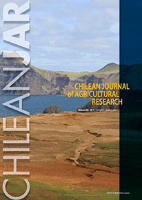
Chilean Journal of Agricultural Research
Scope & Guideline
Empowering research in agronomy and animal science.
Introduction
Aims and Scopes
- Crop Management and Improvement:
Research on various crop species, including genetic improvement, agronomic practices, and the effects of environmental factors on yield and quality. - Soil Health and Fertility:
Studies focusing on soil management practices, nutrient dynamics, and the impact of fertilizers and amendments on soil health. - Pest and Disease Management:
Research on integrated pest management strategies, including biological control, chemical treatments, and the development of resistant crop varieties. - Sustainable Agriculture Practices:
Exploration of sustainable farming practices, including organic agriculture, agroecology, and the use of biopesticides and biofertilizers. - Climate Change and Environmental Impact:
Investigations into the effects of climate change on agricultural productivity, soil health, and water resources, as well as mitigation strategies. - Food Security and Nutrition:
Research addressing food security challenges, nutritional quality of crops, and the role of agriculture in improving public health.
Trending and Emerging
- Biotechnology and Genetic Engineering:
There is a noticeable increase in research involving genetic modification and molecular breeding techniques to enhance crop traits, reflecting advancements in biotechnology. - Climate Resilience in Agriculture:
Emerging studies focus on developing climate-resilient crops and practices that can withstand extreme weather conditions, addressing the urgent need for adaptation strategies. - Precision Agriculture Technologies:
Research incorporating precision agriculture tools, such as remote sensing and data analytics, is on the rise, showcasing innovations that enhance farm management efficiency. - Soil Health and Regenerative Practices:
An increasing emphasis on soil health and regenerative agriculture practices is evident, with studies exploring the benefits of organic amendments and cover cropping. - Water Management and Irrigation Innovations:
Emerging themes in water management highlight new irrigation technologies and practices aimed at improving water efficiency and addressing water scarcity issues in agriculture.
Declining or Waning
- Traditional Farming Practices:
Research on conventional agricultural methods has decreased, possibly due to the increasing emphasis on modern, sustainable practices and technologies. - Single-Crop Systems:
There is a waning interest in studies solely focused on single-crop systems as agroecological approaches and crop diversification gain traction. - Chemical Pesticide Usage:
The focus on chemical pesticides has diminished, reflecting a growing trend towards integrated pest management and organic farming. - Livestock Production Systems:
Research specifically centered on traditional livestock practices appears to be declining, as there is a shift towards more integrated and sustainable approaches. - Non-Genetic Approaches to Crop Improvement:
Research that does not incorporate genetic tools or biotechnology in crop improvement has lessened, as advancements in genetic engineering and molecular biology gain prominence.
Similar Journals
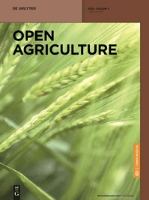
Open Agriculture
Driving Change in the Agricultural LandscapeOpen Agriculture, published by DE GRUYTER POLAND SP Z O O, is an innovative open-access journal dedicated to advancing research in the Agricultural and Biological Sciences. Since its inception in 2016, this journal has been committed to disseminating knowledge and facilitating collaboration among researchers, professionals, and enthusiasts in the agricultural sector. With an impressive Q2 ranking in the Agricultural and Biological Sciences category, it holds a prestigious position, ranking #65 out of 221 in its field, placing it in the 70th percentile. Open Agriculture offers a platform for high-quality research across a diverse range of topics, ensuring that crucial findings are readily accessible to the global scientific community. The journal continues to uphold its mission of promoting sustainable agricultural practices and innovations that address contemporary challenges in food security and environmental sustainability. With its strong commitment to open access principles, researchers and students alike can easily engage with cutting-edge research and contribute to the vibrant discourse surrounding modern agriculture.

SPANISH JOURNAL OF AGRICULTURAL RESEARCH
Pioneering Research in Agronomy and Crop ScienceThe Spanish Journal of Agricultural Research (ISSN: 1695-971X, E-ISSN: 2171-9292), published by the prestigious Consejo Superior Investigaciones Cientificas (CSIC), serves as a vital resource for those engaged in the fields of agronomy and crop science. Established as an Open Access journal since 2003, it aims to foster the dissemination of innovative research and practical applications related to agricultural practices and sustainability. With its Q3 category in Agronomy and Crop Science and a Scopus ranking of #224 out of 406, the journal provides an accessible platform for scholars to share valuable findings that enhance agricultural productivity and environmental stewardship. Covering research from 2006 to 2024, this journal continues to be instrumental for researchers, professionals, and students eager to remain at the forefront of agricultural science advancements.
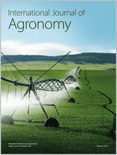
International Journal of Agronomy
Empowering Agronomy Through Open Access InsightsIntroducing the International Journal of Agronomy, an influential publication in the field of agricultural sciences, established by HINDAWI LTD. With an impact factor that reflects its relevance and quality, this journal has been an essential resource for researchers and professionals since its shift to Open Access in 2009, facilitating widespread dissemination of knowledge. Based in the United States, the journal has achieved notable recognition within the academic community, currently ranked in the Q2 quartile among Agronomy and Crop Science, with an impressive Scopus Rank of #139 out of 406 in its category, representing the top 65th percentile. Spanning from 2013 to 2024, it aims to advance the understanding and innovation in agronomy through its rigorous peer-reviewed research articles, reviews, and case studies. With a commitment to enhancing global agricultural practices and sustainability, the International Journal of Agronomy stands as a vital platform for sharing cutting-edge findings that ultimately contribute to the advancement of the agronomic sciences.

SCIENTIA AGRICOLA
Cultivating insights for a thriving agricultural landscape.SCIENTIA AGRICOLA is a prestigious, peer-reviewed journal published by UNIV SAO PAULO, ESALQ, dedicated to advancing the field of agricultural sciences. With the ISSN 1678-992X and an e-ISSN maintaining the same number, this Open Access journal has been a valuable resource since 1992, fostering wide dissemination of knowledge and research findings in agriculture. Hailing from Piracicaba, Brazil, associated with one of the leading agricultural universities, SCIENTIA AGRICOLA serves as an essential platform for researchers, practitioners, and students aiming to explore innovative agricultural practices, crop production, and sustainable techniques. Although specific metrics such as H-Index and Scopus Ranks were not provided, the journal's longstanding commitment to open access and impactful research underscores its importance in contributing to the global dialogue on agricultural efficiency and sustainability.

INDIAN JOURNAL OF AGRICULTURAL SCIENCES
Connecting scholars to transform agricultural sciences.Welcome to the Indian Journal of Agricultural Sciences, a vital resource for researchers and professionals in the field of agricultural sciences, published by the esteemed Indian Council of Agricultural Research. Established in 1974, this journal aims to disseminate high-quality research and developments in agronomy and crop science, facilitating knowledge exchange and advancement within the agricultural community. Though currently classified in the Q4 category according to 2023 data, it provides an essential platform for publication, contributing valuable insights towards sustainable agricultural practices. With an ISSN of 0019-5022 and an E-ISSN of 2394-3319, the journal houses important research that spans decades of convergence and collaboration, promoting innovation in agriculture across India and beyond. As an open access platform, it invites contributions that reflect a wide array of agricultural disciplines to foster sustainable food systems that address the challenges of food security. Join the network of scholars and practitioners by sharing your research and engaging with the profound work being done in this transformative field.

AgriEngineering
Connecting Researchers to Revolutionize Food ScienceAgriEngineering is a premier Open Access journal, published by MDPI, focusing on innovative research across the disciplines of agronomy, horticulture, food science, and engineering. Established in 2019 and headquartered in Basel, Switzerland, this journal has rapidly gained recognition, evidenced by its robust performance in the Scopus rankings and its positioning in Q1 and Q2 quartiles of key categories, including Horticulture and Agronomy. With a commitment to disseminating high-quality research that advances agricultural engineering practices, AgriEngineering provides a platform for researchers, professionals, and students to explore cutting-edge developments aimed at enhancing food production systems and sustainability. Its Open Access model ensures wide-reaching accessibility to vital research outcomes, empowering global collaboration and innovation in the field. For more information on submission and access, you can visit the AgriEngineering website.
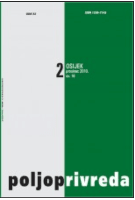
Poljoprivreda
Cultivating innovation in crop science and agronomy.Poljoprivreda is a distinguished open-access journal dedicated to the field of agronomy and crop science, published by the FAC Agriculture Osijek in Croatia. Since its inception in 2000, the journal has been committed to disseminating high-quality research that informs both academic and practical advancements in agriculture. With an ISSN of 1330-7142 and an E-ISSN of 1848-8080, Poljoprivreda provides a vital platform for researchers, professionals, and students to engage with the latest findings and methodologies in agronomy, contributing significantly to the enhancement of agricultural practices in Croatia and beyond. Although currently ranked in the 22nd percentile within its category according to Scopus, the journal aspires to elevate its standing by welcoming innovative research that addresses contemporary challenges within the agricultural sciences. By fostering open access since 2000, Poljoprivreda ensures that its scholarly content is freely available, promoting wider dissemination and collaborative opportunities among researchers globally.
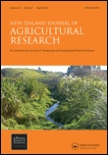
NEW ZEALAND JOURNAL OF AGRICULTURAL RESEARCH
Empowering Agriculture with Cutting-Edge InsightsNEW ZEALAND JOURNAL OF AGRICULTURAL RESEARCH is a prestigious, peer-reviewed journal published by Taylor & Francis Ltd that has been at the forefront of agricultural science since its inception in 1958. With a strong focus on the fields of Agronomy and Crop Science, Animal Science and Zoology, Plant Science, and Soil Science, this journal has established itself in the academic community, achieving a notable Q2 ranking in various agricultural categories as of 2023. The journal thrives on its commitment to disseminating cutting-edge research and innovative practices that address contemporary challenges in agriculture. Although it does not currently offer an open access option, its valuable contributions can be accessed through various academic platforms, ensuring that vital research reaches a wide audience of researchers, professionals, and students globally. The journal's continued relevance and authority are reflected in its strong Scopus rankings, further emphasizing its role as a critical journal within the agricultural sciences.

TROPICAL AGRICULTURE
Transforming tropical agriculture through scholarly insights.Tropical Agriculture is a reputable journal dedicated to advancing knowledge and research in the fields of Agronomy and Development, with a particular emphasis on tropical farming practices and agricultural innovation. Published by the University of the West Indies, this journal serves as a crucial resource for researchers, professionals, and students engaged in the complexities of agriculture in the tropics. Established in 1979, it has witnessed significant contributions and continues to facilitate scholarly discussions through its quarterly publications. While the journal currently holds a Q4 ranking in both the Agronomy and Development categories, its commitment to fostering research excellence positions it as a pivotal platform for emerging studies and regional agricultural advancements. Although not an open-access publication, it provides critical insights and localized research that greatly benefit the agricultural community, particularly within the Caribbean context. Researchers and professionals in the field can rely on this journal for insightful content on tropical agricultural challenges and developments, enhancing knowledge dissemination and application across related disciplines.

PAKISTAN JOURNAL OF AGRICULTURAL SCIENCES
Exploring Agricultural Frontiers for a Sustainable FutureWelcome to the Pakistan Journal of Agricultural Sciences, a prominent platform for disseminating vital research findings in the fields of agronomy, crop science, food science, plant science, and soil science. Published by the prestigious University of Agriculture in Faisalabad, this journal aims to enhance the scientific discourse surrounding agricultural innovation and sustainability in Pakistan and beyond. With an ISSN of 0552-9034 and E-ISSN of 2076-0906, the journal serves as a valuable resource for researchers, professionals, and students interested in cutting-edge agricultural developments. As of 2023, the journal is ranked in the Q3 category for Agronomy and Crop Science as well as Food Science and positioned in Q4 for Plant and Soil Science, highlighting its growing impact within a competitive academic landscape. While the Pakistan Journal of Agricultural Sciences is not currently open access, it provides a comprehensive archive of research converging from 2011 to 2024, ensuring that critical knowledge remains accessible to those striving to advance the agricultural sciences. Join us in our mission to foster innovation and support sustainable practices in agriculture.